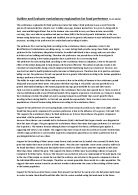Outline and evaluate evolutionary explanations of food preference
Outline and evaluate evolutionary explanations of food preference:
Evolutionary explanations of food preference centre on the idea that food preferences that exist, do so, because they have served an adaptive function in our environment of evolutionary adaptation. This generally assumes that preferences have directed people towards nutritional foods and away from potentially harmful foods; this trait has become universal in humans as only those possessing such traits would survive and pass on these genes. There are several individual evolutionary explanations of food preference; gustation and olfaction, morning sickness, Food Neophobia and aversion learning and finally, the regulatory system.
Gustation and olfaction relates to taste and smell. Humans have taste receptors that are specialised to identify 5 key tastes being sweet, sour, salt, bitter and unami. These tastes are likely to have evolved to enable people to recognise highly calorific foods, while avoiding potentially toxic foods. This would have been useful and so therefore it would have been adaptive. It appears that people still have a preference for sweet and salty foods and this evolutionary explanation would explain this as sweetness acts as an indicator for a highly calorific food whilst saltiness would indicate high sodium content, which the body requires.
Evolutionary explanations of food preference centre on the idea that food preferences that exist, do so, because they have served an adaptive function in our environment of evolutionary adaptation. This generally assumes that preferences have directed people towards nutritional foods and away from potentially harmful foods; this trait has become universal in humans as only those possessing such traits would survive and pass on these genes. There are several individual evolutionary explanations of food preference; gustation and olfaction, morning sickness, Food Neophobia and aversion learning and finally, the regulatory system.
Gustation and olfaction relates to taste and smell. Humans have taste receptors that are specialised to identify 5 key tastes being sweet, sour, salt, bitter and unami. These tastes are likely to have evolved to enable people to recognise highly calorific foods, while avoiding potentially toxic foods. This would have been useful and so therefore it would have been adaptive. It appears that people still have a preference for sweet and salty foods and this evolutionary explanation would explain this as sweetness acts as an indicator for a highly calorific food whilst saltiness would indicate high sodium content, which the body requires.








